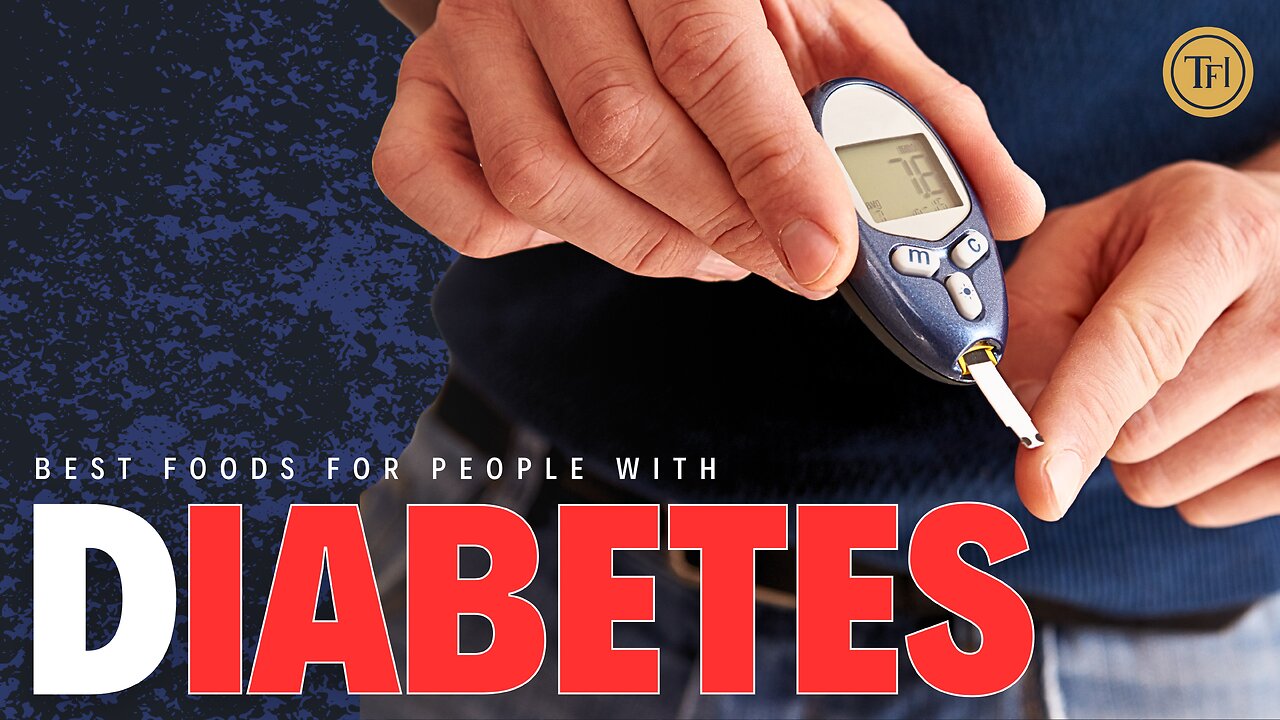Premium Only Content

Diabetes Foods to Eat | Diabetes Control Tips | Type 2 Diabetes Diet | Type 1 diabetes
Diabetes Foods to Eat | Diabetes Control Tips | Type 2 Diabetes Diet | Type 1 diabetes
A diet loaded with fresh vegetables, fibrous fruits, healthy proteins and good fat can benefit people with diabetes.
So here are 12 Foods That Are Good for Diabetics:
1. Whole grain:
Whole grains are rich in fibre and nutrients which helps slow down the digestion process; thus, nutrients are absorbed by the body at a lower pace, preventing sudden spikes in blood sugar levels.
Include Bulgur wheat, buckwheat, oats, millet, quinoa, Brown rice, and barley as they have comparatively lower glycemic index and beneficial in diabetes.
2. Green Leafy Vegetables: (spinach, kale etc.)
Green leafy vegetables are rich in nutrients and are low in calories.
Eat raw vegetables like salad, at the beginning of meals since cooking vegetables can destroy certain phytochemicals.
3. Nuts:
Consuming nuts like walnuts, almonds, hazelnuts, and pistachios along with a controlled diet can help in improving blood sugar levels in patients with type 2 diabetes.
Regular consumption of nuts may reduce inflammation and lower blood sugar, HbA1c (a marker for long-term blood sugar management), and LDL (bad) cholesterol levels.
4. Greek Yogurt:
Greek yoghurt has a low glycemic index (GI) and is rich in protein, calcium, probiotics and low in carbohydrates. It helps keep you full for longer.
5. Garlic:
Garlic is Eating garlic improves glycemic status and is known to reduce fasting and post-prandial blood sugar levels. It is also rich in manganese, vitamin B6, C, Selenium & fibers.
6. Cinnamon:
Cinnamon enhances the release of insulin and the signalling of insulin receptors, thus helping in the management of diabetes.
It also prevents a sudden rise in sugar levels after meals.
7. Apple cider vinegar:
Apple cider vinegar effectively reduces blood glucose levels after meals and is also known to improve the function of insulin.
8. Beans:
Beans are rich in vitamin B, minerals (Calcium, magnesium and potassium) & fibers
Fibres and protein keep us full longer and reduce our carbohydrate intake.
9. Berries:
Berries are powerful antioxidants. They contain polyphenols that may improve insulin sensitivity in adults and thereby lowering blood glucose.
Berries like blueberries, strawberries were found to be useful in regulating blood glucose levels and thus proved to be beneficial for diabetics.
10. Eggs:
Eggs may decrease inflammation, improve insulin sensitivity, increase your HDL (good) cholesterol levels. Hence, they may reduce the risk of heart diseases in diabetics.
11. Broccoli
Broccoli is one of the most nutritious vegetables.
Broccoli is low in calories and digestible carbs. Including broccoli sprouts in your diet may lead to a reduction in blood glucose in people with diabetes.
12. Fatty Fish:
Fatty fish like salmon, herring, sardines, anchovies and mackerel are rich sources of omega-3 fatty acids, DHA & EPA.
Since, diabetics are at an increased risk of heart diseases, these fats are beneficial in diabetics.
Fatty fish is also rich in proteins, which makes you feel full for a long time and reduces your carbohydrate intake.
Subscribe to our channels to stay updated:
www.youtube.com/c/thefoodinterval
www.facebook.com/thefoodinterval
www.Instagram.com/thefoodinterval
www.twitter.com/thefoodinterval
Time Stamps :
00:00 Introduction
01:23 Foods to Incorporate
05:15 What is a Good Diet?
05:56 Foods to Limit
05:46 Sample Diet Plan
08:32 What About Gestational Diabetes?
09:18 Frequently Asked Questions
#diabetes
#diabetesfoodstoeat
#type2diabetes
#diabetescontroltips
#thefoodinterval
Medical disclaimer: The Food Interval does not provide medical advice. The content available in our books and videos, on our website, or on our social media handles do not provide a diagnosis or other recommendation for treatment and are not a substitute for the professional judgment of a healthcare professional in diagnosis and treatment of any person or animal. We intend to provide educational information only. The determination of the need for medical services and the types of healthcare to be provided to a patient are decisions that should be made only by a physician or other licensed health care provider. Always seek the advice of a physician or other qualified healthcare provider with any questions you have regarding a medical condition.
@TheFoodInterval
-
 LIVE
LIVE
Robert Gouveia
2 hours agoMatt Gaetz REJECTS Report, Sues Committee; Luigi Fan Club Arrives; Biden Commutes; Festivus Waste
2,792 watching -
 58:10
58:10
Kimberly Guilfoyle
3 hours agoAmerica is Back & The Future is Bright: A Year in Review | Ep. 183
15.2K14 -

vivafrei
8 hours agoEp. 242: Barnes is BACK AGAIN! Trump, Fani, J6, RFK, Chip Roy, USS Liberty AND MORE! Viva & Barnes
52.8K21 -
 LIVE
LIVE
Dr Disrespect
6 hours ago🔴LIVE - DR DISRESPECT - MARVEL RIVALS - GOLD VANGUARD
3,686 watching -
 1:15:00
1:15:00
Awaken With JP
5 hours agoMerry Christmas NOT Happy Holidays! Special - LIES Ep 71
75.8K79 -
 1:42:21
1:42:21
The Quartering
7 hours agoTrump To INVADE Mexico, Take Back Panama Canal Too! NYC Human Torch & Matt Gaetz Report Drops!
61.6K43 -
 2:23:15
2:23:15
Nerdrotic
6 hours ago $8.26 earnedA Very Merry Christmas | FNT Square Up - Nerdrotic Nooner 453
42.9K4 -
 1:14:05
1:14:05
Tucker Carlson
6 hours ago“I’ll Win With or Without You,” Teamsters Union President Reveals Kamala Harris’s Famous Last Words
122K268 -
 1:58:31
1:58:31
The Dilley Show
6 hours ago $27.24 earnedTrump Conquering Western Hemisphere? w/Author Brenden Dilley 12/23/2024
109K27 -
 1:09:59
1:09:59
Geeks + Gamers
7 hours agoSonic 3 DESTROYS Mufasa And Disney, Naughty Dog Actress SLAMS Gamers Over Intergalactic
70.5K17